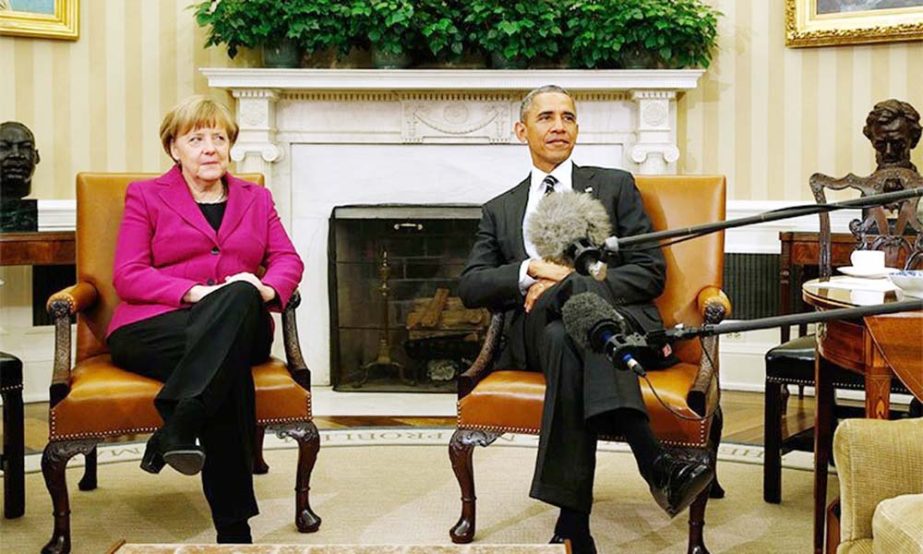
AFP, Kiev :
Europe on Monday postponed sanctions against Moscow ahead of a Ukraine peace summit as US President Barack Obama and German Chancellor Angela Merkel weighed options to end 10 months of bloodshed.
Merkel was in Washington as cracks between Europe and the United States seemed to emerge over the White House’s mulling of sending arms to Ukraine, an idea flatly rejected by the German leader.
Officials from Ukraine, Russia, Germany and France, meanwhile, were hammering out the details for a four-way summit Wednesday on a European-brokered peace plan billed as a last chance to defuse the escalating conflict.
Ahead of the possible summit in Minsk, French Foreign Minister Laurent Fabius said the EU would hold off implementing new sanctions to improve the chances of halting fightng that has killed some 5,400 people.
“The latest peace initiative shows that things have begun to move,” Fabius said in Brussels.
EU foreign ministers had been set to formally sign off on adding 19 more people to a sanctions list over Moscow’s alleged backing of pro-Russian separatists in Ukraine.
Russian President Vladimir Putin has warned that a “number of points” still needed to be hammered out before the Minsk meeting can take place and wrangling was set to be intense as foreign ministry officials from the four nations met in Berlin.
Based on a largely ignored peace deal agreed in September in Minsk, the new plan may extend rebel control over territory they have seized in recent weeks, although Kiev is adamant the demarcation line agreed in September should not be shifted.
French President Francois Hollande has said the proposal includes the creation of a 50- 70-kilometre (31-44-mile) demilitarised zone around the current frontline.
German foreign ministry spokesman Martin Schaefer said the Minsk talks’ goal would be “a ceasefire to end the bloodshed and thus create space and time for political talks”. The issues on the table include questions about levels of regional autonomy and future elections in rebel-controlled areas, Schaefer said.
Fresh fighting over the past 24 hours between government forces and pro-Russian rebels left at least 11 civilians and nine Ukrainian troops dead, Kiev said.
Ukraine’s military said that 1,500 Russian troops and convoys of military hardware had crossed into the country over the weekend.
In a four-way telephone talk on Sunday Putin, Merkel, Ukraine’s President Petro Poroshenko and Hollande floated the summit as a the next step to finding a “comprehensive settlement” to end the conflict, Berlin said.
Merkel and Hollande have ramped up their push for peace in recent days, jetting to Kiev first for talks with Poroshenko and then to Moscow to meet with Putin, who the West accuses of masterminding the violence.
A September peace deal agreed in Minsk has been largely ignored, with fighting escalating in recent weeks as the rebels push further into government-held territory.
Hopes of getting the four leaders together hang in the balance as officials came together in Berlin with German Foreign Minister Frank-Walter Steinmeier cautioning that the leaders’ summit was “not yet sure”.
“Our principal objective is to prepare the elements for a document that is acceptable to Ukraine,” Olexiy Makeyev, a senior Ukrainian foreign ministry official heading to the meeting, told AFP. Monitors from the Organization for Security and Cooperation in Europe (OSCE), representatives from Kiev and Moscow and the rebels are also set to hold a meeting Tuesday, Ukraine says.
Meanwhile, President Barack Obama is expected – as early as Tuesday – to ask Congress for new war powers, sending Capitol Hill his blueprint for an updated authorization for the use of military force to fight the Islamic State group.
Haggling then begins on writing a new authorization to battle the Sunni extremists, who have seized territory in Iraq and neighboring Syria and imposed a violent form of Sharia law. That will lead to the first war vote in Congress in 13 years – one of the most important votes faced by members of the House and Senate.
To get Congress to approve his request, Obama must find a balance between lawmakers who want wide authority to fight the Islamic State group and others, including members of his own party, who worry that a new authorization to use military force will lead to U.S. entanglement in another protracted war.
In 2002, Congress passed a resolution authorizing President George W. Bush to use force against Iraq – a vote that scores of Democrats have regretted and then-candidate Barack Obama used as a cudgel against his rivals to win the Democratic presidential nomination.
Obama so far has relied on congressional authorizations that former President Bush used to justify military action after 9/11. Critics say the White House’s use of these authorizations to fight the terrorist group is a legal stretch at best. The president earlier insisted he had the legal authority to deploy more than 2,700 U.S. troops in Iraq to train and assist Iraqi security forces, and conduct ongoing airstrikes against targets in Iraq and Syria.

